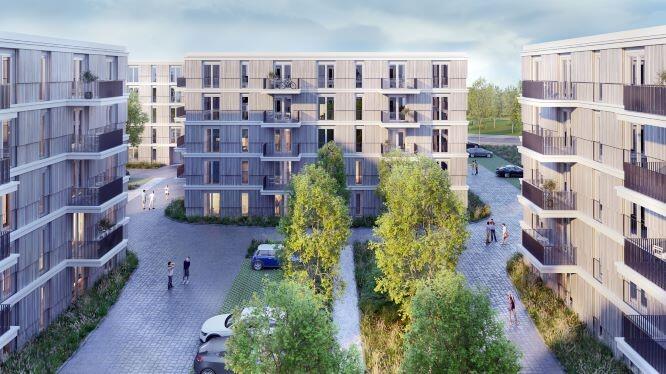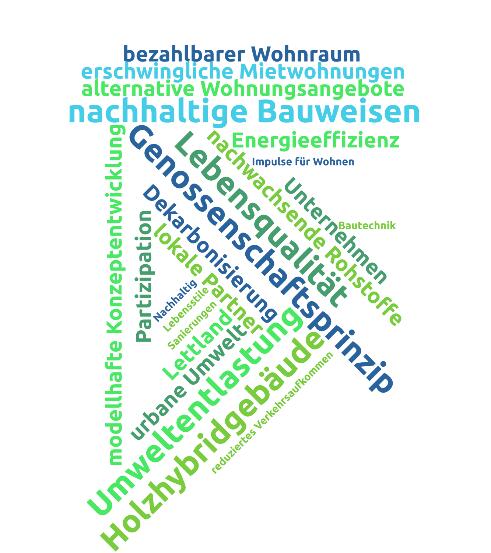Development of a wood hybrid multi-family house for affordable rental housing in Latvia
International project funding
Subject and goals of the project
The housing market in Latvia, as in most countries of the post-Soviet space, is deformed: It has a high homeownership rate of over 90 percent, resulting from short-term and extensive privatization measures of formerly state-owned housing in the early 1990s. In addition to the overabundance of privatized housing, there is a lack of alternative housing options such as affordable rental housing or even social housing. New construction projects are mostly in the high price segment and cannot meet the demand for housing given the majority of the population is less financially strong.
Jelgava, Latvia's fourth largest city with approximately 60,000 inhabitants, has been experiencing successful economic development for years, with a steadily increasing demand for affordable housing from young families and professionals in various fields. The city wants to create new, alternative housing in the rental segment and has commissioned JNIP, cooperation partner in the project, to develop solutions. The creation of quality rental housing in the inner-city area, which families with children and young people at the beginning of their working career can afford, on the one hand reduces the volume of traffic and the resulting environmental pollution, and at the same time increases the quality of life of city residents. From a socioeconomic perspective, providing new affordable housing in inner cities can counteract the outflow of young workers and the resulting demographic trends that have challenged Latvia for many years. Large-scale introduction of the cooperative principle in housing – combined with the application of innovative, sustainable construction methods, but also in preparation for refurbishment – can be a major lever for energy upgrading, decarbonization, increasing climate compatibility and structural quality of new and existing residential buildings in Latvia and the wider region.
Innovation and exemplary nature of the project
With the model concept development of a sustainable timber hybrid building with a very high energy efficiency based on the raw material wood, a type of house is to be developed for the Latvian housing market, which will lead to exemplary environmental relief in the construction of future new buildings in the multi-family house segment and at the same time help to provide affordable housing for lower and middle income groups.
Within the framework of the project in Jelgava, concrete preparations are being made for the construction of several rental apartment buildings, which will serve as an exemplary demonstration of
- the technical and financial feasibility,
- the energetic and value-added advantages of wood hybrid construction in Latvia, and
- the high quality of the resulting housing and its affordability through the cooperative principle.
The innovative technical concept and also the cooperative rental housing model – offered in combination by the European housing cooperative LiM SCE – will be developed, discussed and jointly adapted for the Latvian market on a broader scale in Latvia. This will create a housing alternative on the Latvian housing market that will provide new impetus for housing, construction, and neighborhood and urban development.
Special aspects of the project
The project thrives on the cooperative spirit: What one person cannot do, many can do together. The housing industry and cooperative approach is fundamentally based on the participation of local partners and future housing users. The city of Jelgava and its company JNIP are active, driving forces in this regard and a pioneer for Latvia.
In addition, both the technical concept (as a proposal for a 'new' type of building, which still has to be adapted to Latvian standards) and the housing and financing model are being coordinated with the Latvian Ministry of Economic Affairs, as this ministry will launch a construction funding program and is in contact with various actors for this purpose.
Funding subject: Energy- and resource-saving district development and renewal
Cooperation partners:
- Initiative Housing Industry Eastern Europe (IWO) e. V., Berlin
- Jelgava Municipal Housing Administration Company SIA (JNIP), Jelgava, Latvia
Associated partners:
- Berliner Bau- und Wohnungsgenossenschaft von 1892 eG, Berlin
- tafkaoo architects Berlin, Wien, Helsinki
- Engineering company BBP Bauconsulting mbH, Berlin
- B&O Group, Berlin, Bochum, Munich
- LiM Living in Metropolises SCE with limited liability, Berlin
Location: Jelgava (Republic of Latvia - Baltic States)
Funding period: December 2019 to December 2021
Project costs: Total volume: 250 000 Euro, DBU funding: 124 998 Euro
DBU-AZ: 35522
Note: Translation of the German version with DeepL
Last updated: 15.11.2021



